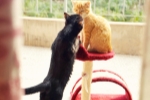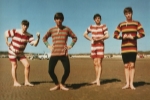
英语作文常用句型十句【一】
(一)改写一般疑问句:
(1)原句中有be动词的,将be动词提前,其他顺序不变。
例如:Thisisacat.变为Isthisacat?
(2)原句中有情态动词的(can/may/shall/would)将情态动词提前,其他顺序不变。例如:Hewouldlikeapie.变为Wouldhelikeapie?
(3)原句中是一般动词的,在句首加助动词do或dose(用于主语是第三人称动词单数的句子),其他顺序不变。例如:Iplaytheguitar.变为Doyouplaytheguitar.
(4)原句中的some变any。
注:以情态动词开头的一般疑问句,并且要求对方做肯定回答的`some不变。
(5)原句中的第一人称改为第二人称。例如:Iamanurse.变为Areyouanurse?
(6)以dose开头的一般疑问句,原来动词的第三人称单数形式要变回原形。例如:Hereadsastorybook.变为Dosehereadastorybook?
(二)改写否定句:
(1)原句中有be动词的,直接在be动词后面加not。例如:Itisadog.→It’snotadog./Itisn’tadog.
(2)原句中有情态动词的,直接在情态动词后加not。
例如:Iwouldlikeahotdog.→Iwouldnotlikeahotdog.
(3)原句中是一般动词的,在一般动词前加don’t或doesn’t(用于主语是第三人称单数的句子),doesn’t后面用原型。例如:Iseethreehamburgers.→Idon’tseethreehamburgers.
原句中的some变any例如:Ihavesomebreadan
dmilk.→Idon’thaveanybreadandmilk.
(4)以let开头的祈使句,如果是letus或letme,直接在其后加not;如果let后面其他人称代词宾格(you、him、her、them、it)就在let后面加助动词don’t。例如:Letusgotothepark.→Letusnotgotothepark.再如:Letthemdohomework.→Don’tletthemdohomework.
(三)对划线部分提问:
对划线部分提问,就是先把一个陈述句的划线部分去掉,然后变为一个特殊疑问句:一是特殊疑问句+一般疑问句;
二是特殊疑问句+陈述句(对主语或主语的定语提问,therebe结构除外)
⑴划线部分是人,用who提问。
⑴划线部分是主语,用who提问,who后面的动词要用第三人称单数形式。如:Whois;Wholikes;Whohas?
方法:who+原句的剩余部分
例如:①HelenandMikearelisteningtomusic.
→Whoislisteningtomusic?
②Ihavesomemodelplanes.
→Whohasanymodelplanes?
⑵划线部分是表语,用who提问。
方法:Who+剩余部分的一般疑问句形式
⑵划线部分是事或者物,用what提问。
方法:what+剩余部分的一般疑问句形式。
注:如果原句是therebe句型,直接用What’s+地点状语来提问。例如:①Wewouldliketobuysomethingsforaparty.
→Whatwouldyouliketobuyforaparty?
②Therearealotofcakesintheplate.
→Whatisintheplate?
⑶划线部分是物主代词或名词所有格,用Whose提问。
方法:⑴划线部分是主语的定语时,Whose+剩余部分
例如:Ourclassroomisbright.
→Whoseclassroomisbright?
⑵划线部分是表语或表语的定语时,Whose+剩余部分的一般疑问句形式例如:①ThewomanisSuYang’steacher.
→Whoseteacheristhewoman?
注:对某部分的定语提问,被修饰的部分跟随特殊疑问句往前提②ThispurseisYangLing’s.
→Whosepurseisthis?
⑷划线部分是地点,用where提问。
方法:where+剩余部分的一般疑问句形式
例如:TheyarehamingaMathslessonintheclassroom..
→WherearetheyhavingaMathslesson?
⑸划线部分是“多少”,用howmany或howmuch提问。
方法:⑴句中是可数名词的用Howmany+剩余部分的一般疑问句形式例如:Therearefifteentreesintheplayground.
→Howmanytreesarethereintheplayground?
⑵句中是不可数名词的用Howmuch+剩余部分的一般疑问句形式例如:Ihaveaglassofjuiceforbreakfast.
→Howmuchjuicedoyouhaveforbreakfast?
⑹划线部分是时间,用when或whattime(具体的几时几分)提问。方法:⑴when+剩余部分的一般疑问句形式
例如:SuYangandSuHaiareathomeonSundaymorning.
→WhenareSuYangandSuHaiathome?
⑵问具体的时间直接用Whattimeisit?或What’sthetime?问
例如:It’sthreeforty-five.
→Whattimeisit?或What’sthetime?
英语作文常用句型十句【二】
邀请信:
It is my pleasure / a great honor for me to invite you to ...
I am sure that you will enjoy yourself here.
I hope that you won’t decline my invitation.
感谢信:
It was kind and generous of you to do this for me and I do appreciate it more than I can say.
Thank you from the bottom of my heart for ...
道歉信:
I am terribly sorry that I have done ...
I hope that the settlement of the matter will meet your wishes.
I regret to inform you that I am unable to do ...
询问信:
I am writing to you in the hope that I may obtain ...
I shall be grateful if you can offer me the information about ...
I would like some detailed information about ...
求职信:
I wish to apply for a position with your company.
I am very interested in exploring a position as a ... with your company.
I trust myself that I have the appropriate qualifications and experience for this post.
投诉信:
I am writing to express my dissatisfaction with / at ...
I am completely disappointed to find ...
英语作文常用句型十句【三】
Therearesomecherriesinthebasket.(一般疑问句,否定回答划线部分提问Kittylikesthebluedress.(用thepinkdress改为选择疑问句Don`tplaywithfires.(换一种说法
Joelikesreading.Dannylikesreadingtoo.(把两句连成一句Pleaseeatsomecakesandbiscuits.(改为否定句划线部分提问Thereissomewaterintheglass.(划线部分提问划线部分提问Whatdayistoday?
What`sthedatetoday?
Whatdoyouusuallydoafterdinner?
Whichpearsdoyouwant,thegreenonesortheyellownoes?Whichwesternholidaydoyoulikebest?Whenisit?
WhatdoyoudoattheLanternFestival?
5B2
Thosebooksareours.(同义句划线部分提问划线部分提问
ThosecrayonsareDanny`s.(.(用Alice改为选择疑问句Arethesetheirschoolbags?(单数句划线部分提问
Theyridetheirbicyclestothepark.(用May改写
Thecocooniswhite.(用browng改为选择问句划线部分提问Heisfouryearsold.(改为一般过去时
Iwasathomeyesterdayevening.(改为一般疑问句
Thecaterpillarslikeeatingleaves.(改为单数句划线部分提问划线部分提问
WhatdoyoueatattheMid-autumnFestival?(根据实际情况回答
英语作文常用句型十句【四】
1:Peoples views onvary from person to person. Some hold thatHowever, others believe that
2:People may have different opinions on
3:Attitudes towards vary from person to person.==Different people hold different attitudes towards
4:There are different opinions among people as to

















